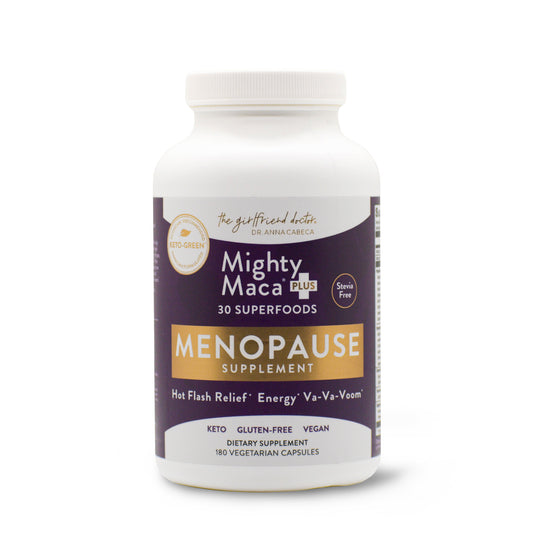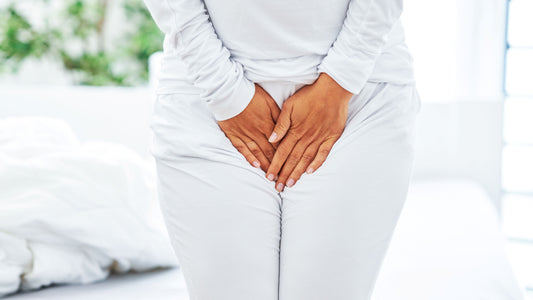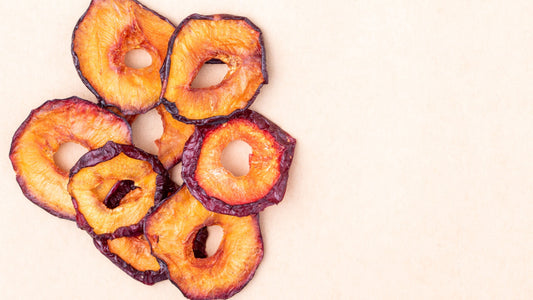Sexuality and menopause. It’s one of those symptoms of menopause we don’t often think about. After all, when you’re battling weight gain, fatigue, and hot flashes, your libido is often the last thing on your mind. But your sex drive (or lack of it) can actually be an indicator of your physical and mental health.
So if your libido has packed up and moved, leaving no note — please know you are not alone. Menopause and no libido unfortunately often go hand in hand.
For one thing, menopause affects your hormone levels, notably estrogen and testosterone. And when these hormones decrease, it can lead to dry and thinning vaginal tissues (which makes sex painful). Then there’s the fact that the incidence of depression increases during menopause. That also doesn’t help your libido.
But there are so many things you can do to reclaim your libido during menopause. Let’s get your love life back on track, Girlfriend.

How Does Menopause Affect Libido?
It’s estimated up to 40% of women going through perimenopause and menopause experience a decrease in libido. (1,2,3)
In many ways, this phenomenon is tied to dropping levels of both estrogen and testosterone. (4,5) Yes, the hormone that we traditionally classify as a “male” hormone is important for a woman’s sex drive, too — and testosterone starts to decrease significantly in your 30s and 40s.
Here’s how the decrease in estrogen and testosterone creates low libido in menopause.
Vaginal Dryness, Sexuality, And Menopause
For one thing, your vaginal and vulvar tissue rely heavily on estrogen to keep them plump and moisturized.
So when your estrogen levels drop off, it has an outsized effect on your tissues down there.
Your vagina and vulva feel thin and dry. And that is definitely not a recipe for desire.
What’s more, a lack of sufficient estrogen also affects your urethra in a similar way. This leads to an increase in urinary tract infections. Which makes things painful down there. And it also tends to make you feel self-conscious about leaking urine and odors, too.
No one wants to have sex when you’re in pain. So that means for many women, menopause and no libido go hand in hand.
I’ll go into this in more detail later on, but if your vaginal tissues are feeling dry and thin, and it’s affecting your love life, be sure to check out my Julva® Revitalizing Cream here.
Depression And Menopause
Another common symptom of menopause is depression. And a common symptom of depression is low libido. When you’re depressed, it’s often hard to find joy in things you typically love doing. For some women, this means your sexuality and your sex drive are negatively impacted.
On top of that, depression medication has a reputation for destroying your libido. In fact, statistics suggest low libido is the number one complaint of women taking depression medications. (6)
So, if menopause is affecting your mental health, and you’re receiving medical treatment for it…that can play a huge role in your loss of libido.
Testosterone, Menopause, And Libido
Remember earlier when I mentioned testosterone levels tanking in menopause? Well, a decrease in testosterone can contribute to a general lack of sex drive that has nothing to do with pain, infections, or depression.
Because testosterone plays a role in how you feel and think about sex, when it’s less plentiful, that can cause a decrease in libido during menopause.
A lot of women tend to rush into testosterone replacement therapy here. While that might be the right option for you, just be sure to do your research and consider the fact that testosterone is often administered via time-release pellets that are inserted into the fat under your skin. These pellets have to be replaced regularly — which means you have to get cut open every 90 days and have a new pellet inserted.
Plus, many women who undergo testosterone replacement therapy report mood swings, acne, and hair growth on their chin, chest, and abdomen. These are common side effects from increased androgens circulating in your body.

Menopause And Sexless Marriage
Now that we understand some of the reasons why menopause can affect your sex drive, let’s figure out what to do about it. Because menopause certainly doesn’t have to be the end of your sexuality and active sex life.
I know a lot of people who suddenly become baffled when their wives enter menopause and their libido tanks. Partners feel rejected, frustrated, and disappointed when it seems as if all of a sudden their wife is no longer interested in having relations with them.
Now, not every sexless marriage is related to menopause. There are many factors that go into long-term relationships and hormonal changes during menopause are just one of them. In fact, men experience changes to their libidos as they age too, due to a process called andropause — so sometimes women are on the receiving end of disinterest in sex.
But if you find yourself frustrated and disappointed with a decline in the quality of your sex life during menopause, there are things you can do to rekindle that flame. And possibly turn your sexless marriage back into a sexually fulfilling one.
Let’s take a look at how to increase libido during menopause.
What Helps With Libido During Menopause?
Menopause libido help is here! These are the top 5 things I often recommend to help my patients recover their sex drive.
So without further ado, here are my menopause libido natural remedies.

1. Rev Up Your Sex Drive With Adrenal Support
Your adrenal glands are tiny glands that sit atop your kidneys. And they are the cornerstone of your hormonal health.
Keeping your adrenals happy should be your number one priority during perimenopause and menopause. If you can do this, they will produce adequate amounts of dehydroepiandrosterone (DHEA) — which your body can use to make testosterone, progesterone, and estrogen. Basically, when your ovaries are no longer churning out hormones, your adrenals can swoop in and save the day. So that means proper adrenal support can help you get your sex drive back.
The problem is, your adrenals can be kind of delicate. They get compromised easily when you:
- Don’t have adequate intake of nutrients, especially B vitamins and vitamin C
- Are under stress
- Undereat, over-exercise, or go to bed late
My favorite tool for ensuring your adrenals have the support they need is an adaptogen called maca. It’s a natural root that’s been used for centuries in South America to support sexual function and libido. And it’s incredible for helping your adrenals stay strong in the face of stress…which helps them focus on pumping out DHEA rather than cortisol. Which in turn helps reignite your libido and keeps hot flashes from ruining your day.
My Mighty Maca® Plus formula combines maca with dozens of other adrenal nourishing superfoods so you never have to guess if you’re giving your adrenals everything they need to be happy and make your menopause journey less hectic and more sexually fulfilling. Click here to learn more.

2. Nourish Your Vaginal Tissues
Like we talked about earlier, thinning and dry vaginal tissues are one of the main reasons women experience a ‘menopause reduced libido.’
It may come as no surprise that your adrenals and DHEA production can also help here — because if you remember, it’s a lack of estrogen that makes your vagina and vulva dry out. So if you can keep your adrenals focused on prioritizing DHEA production over cortisol production…that means your body can make some extra estrogen and help your tissues down there feel like they used to.
If you need a little help in the vaginal dryness department, my Julva® Revitalizing Cream contains DHEA and is applied directly to your vulvar and vaginal tissues. Since your lady parts are very vascular, they can absorb the DHEA and let it work its magic. Thousands of women have used Julva® to reclaim their sex lives and experience pleasure in the bedroom again. Check it out here.

3. Menopause And Your Diet
Bottom line: what you eat during menopause matters. When your diet is laden with sugars and refined carbohydrates, you’re likely increasing inflammation in your body. And compromising your insulin response and blood pressure, too.
All of these things play a role in your sexual health and your sexuality during menopause. When you’re having problems with circulation and blood flow — the first place your body will de-prioritize is your vagina. That means added difficulty with lubrication and climaxing.
Inflammation can also hit your adrenals quite hard, and if you revisit the first item on this list, you’ll understand how your adrenal health makes a massive impact on your menopause experience.
While diet isn’t the only thing that drives inflammation, changing your diet is something that’s completely within your control. And it can be the key to unlocking a stronger sex drive in menopause.
For best results, be sure to add plenty of nutrient-rich vegetables to your diet — especially leafy greens and cruciferous veggies. And don’t forget the healthy fats. Your body needs those to make hormones!
For a foolproof, quickstart way to get your diet on the right track, be sure to grab my FREE Menopause Recipe Guide here (it’s filled with delicious foods that make eating for your hormones easy).


4. Prioritize Your Mental Health
When you’re juggling your career, teenagers, aging parents, relationships, and menopause — it feels like a lot. And that often means your mental health and self-care get relegated to the back seat.
When you’re so busy and you have so much on your plate, it may seem counterintuitive to think about adding another priority to your to-do list.
But just like in an airplane emergency, where you’re encouraged to put on your own oxygen mask before assisting others…when you fill your own cup and take care of your needs in the form of self-care, exercise, meditating, journaling, or meeting with a therapist — that allows you to be the mom and partner you want to be.
In other words, it’s not selfish to put your health and well-being first on your list.

5. Talk To Your Partner About Menopause And Sexuality
Taboos around menopause and women’s sexuality keep us from clearly relaying what we’re going through. That leaves your partner in the dark, wondering if it’s something they did, or if you’re having an affair when your libido crashes and menopause symptoms affect your sexuality.
I’d encourage you to use this as an opportunity to explain to your partner how your hormones are driving your behavior and your libido loss. The more conversations we have about these issues — the faster we can move forward, together.
Can Libido Come Back?
On a final note, menopause and libido loss do not have to necessarily stick around forever, ruining your sex life and your relationship. Many women remain sexually active during menopause and beyond.
So if you’re wondering why you suddenly have no libido, be sure to try the suggestions I outlined here — and don’t forget to support your adrenals, Girlfriend.









